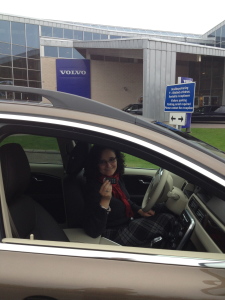Yesterday I filed my American taxes (thank you, Turbotax). I also am in receipt of multiple German tax bills–none of which I must pay, but each of which I need to address if I don’t want, say, our German bank to withhold money. What I have to say today about taxes…
Let’s start with American taxes: I have mixed feelings about paying the full amount of taxes in a country and state whose services we are barely using. I am more in support of US federal taxes, though, as the US Government is precisely who would helicopter our asses out of here in an emergency. I can vote in presidential elections. We have access to military base facilities like the commissary, PX, etc.; these are no small conveniences and I appreciate them, so I actually complain very little about paying taxes. Well, except last year, when we still owed Virginia taxes even after a year of paying them. I complained then.

The Commonwealth of Virginia does issue my driver’s license, without which my German license would be invalid due to the agreement between the US and Germany. (We own property in Virginia, but I have no complaints whatsoever about paying taxes on the property, or on rent earned from the property. That income is physically earned in Virginia, not in Germany.) Sure, it’s the US government who pays Paul and whose military-base soil Paul technically works on within Germany, but it ain’t Virginia’s soil. I therefore can see how this is perceived to be American-taxable income, but not Virginia-taxable income. Just sayin’.
I have equally mixed feelings about not paying German taxes. We are using services provided by Germany: schools, roads, etc. (Not medical care—we pay out of pocket and use American health insurance for that. NB: even paying out of pocket, medical bills in Germany are reasonable. For fairly routine medical care, I wouldn’t even need insurance to afford the bills.) But overall, where do we live and whose services do we use on a daily basis? Germany’s.

Obviously we cannot pay taxes to both countries. We would go broke.
There is an agreement between Germany and America called the Status of Forces Agreement, or SOFA agreement. It provides guidance for taxes, driver’s licenses, and many other situations. It is this agreement that dictates that our taxes go to Uncle Sam.
Just a note regarding licenses: there is reciprocity between some US states and Germany for visitors. In other words, visitors who are residents of those particular states can legally drive here without an international or German license. However, an American expat wanting to drive here typically has to go through the rigormarole of obtaining a German license within, the last I knew, six months of arriving. This can be a complex, several-month process involving several hundred euro, tests, a few driver’s school lessons, first aid classes, vision exams, etc. And if you must take the full driver’s course, we’re talking much more time and 1000-2000€! Under the SOFA agreement, those who hold valid US licenses are required only to take a one-day class, pass it, and bam!, we’re legally whizzing down the Autobahn and stressing out everyone in traffic circles for the next several years.

Back to taxes…the one tax we do usually pay here is the Value Added Tax (commonly referred to as the VAT tax). I actually fully support the VAT tax used by European countries. In fact, we do not use our VAT exemption very often—only for purchases over $150 or so–mostly because of my overwhelming guilt for not paying German taxes. I wish America would consider a VAT tax (but: in conjunction with lower income taxes). The VAT tax is comparable to the American state sales tax, but is typically much higher. In Germany, for example, the normal VAT tax is 19% and the reduced rate (food, hotels, and a few other types of purchases) is 7%. In some European countries the VAT tax can be as high as 25%. So how could I possibly like the VAT tax? Because 1) you choose to pay it by making your purchase—it is unrelated to employment; 2) the more affluent a person is, the more they spend, in effect taxing the rich more than the poor, but again, by choice and not what appears to some to be a penalty on earning a higher salary; 3) the tax on food is significantly reduced, making it more affordable to everyone. If I choose to spend more money on higher-quality items or choose to spend money more often, I pay more in taxes than someone without the same purchasing power. This seems fair to me.
A tax exemption agreement is in place for DoD employees, military and civilian alike. The form allows for a VAT exemption that is a bit different from the regular tax-free form that tourists can use for a refund on taxes paid. We have to purchase these forms, for a few euro apiece. When we use our VAT form, the VAT tax is removed from the purchase before it is rung up, or refunded immediately after the purchase, at the point of purchase. Some cashiers do it at the register, while some stores do it at the customer service desk. We don’t have to track someone down at the airport or border crossing. There are purchases that are not eligible for tax-free status, and a merchant is not required to honor the form, but most do—some with a fuss, some without.

But Kari, where are you going with all of this? My head is about to explode.
Germany has many other taxes: high income taxes, a tax on radio and television that is mandatory for all households, a church tax, and who knows what else. I am quite familiar with the radio and television tax bill and, recently, the church tax notice, so that’s what I’m going to talk about.
Two years ago, we began receiving a tax bill for radio and television. We are exempt from this tax. I wrote to the tax office and referenced the SOFA agreement. The bills kept coming. I called the base legal office (another service available to us, thank you, US Government). They contacted the pertinent authorities. The bills kept coming–some ending up, admittedly, in the trash. I wrote a second time, to no avail. This week I received: yet another bill. So Paul is going to have to drive to Wiesbaden to personally visit base legal again.
Meanwhile, the church tax: I opened a bank account at Volksbank in Germany thinking it would be easier than driving to Wiesbaden to make bank transfers—I’ll go ahead and explain that in a minute. Sometime last year, I received a notice that as of the beginning of 2015, the banks would be required to take action if an accountholder owed back church taxes. I took the notice into the bank, informed someone that we are exempt from the tax, and they said not to worry about it. Hah.
This week, I received another notice about this church tax. It would appear that the bank will soon be taking action. I’m going to close the account.
This is not the first time I have required legal intervention. After I thought I had dealt with an immigration issue, I eventually received a notice to return to the bureau. With guidance from the legal office, I was able to reference the exact SOFA Agreement text for my exemption, in a letter to the bureau. I have not heard from them since.

And why did we open a German bank account? Let me explain our bank accounts.
We arrived in Germany with our bank accounts at USAA (a bank we love). USAA’s system does not have the ability to communicate with the European system. This actually surprised me, given that USAA serves only military (active, separated, and retired), and their dependents. That’s exactly who finds themselves in other countries. But I digress. In Germany, you pay bills either by transferring the money from your bank to theirs, or by allowing for automatic withdrawals. We opt for the automatic withdrawals when available, but there are times when you pay someone once, like a painter or gardener. There are no checks here—everything is done by transfer. Because USAA’s system does not work over here, we opened a new bank account with…
Community Bank. It is, unfortunately, affiliated with the Bank of America. However, as the overseas division, Community Bank (CB) is able to participate in Europe’s transfer system. We set up all of our automatic payments through CB. The only problem? They did not, at the time, have online banking for Euro payments. You could only pay a bill by visiting one of the CB offices and filling out a form. When you live an hour from the closest one, it is rather inconvenient. So we opened an account with…
Volksbank. Now we have three banks (and I am really good at keeping all of this straight…NOT). The Volksbank account was opened specifically so that I could 1) make online payments, 2) have a bank in town if I needed to visit in person, and 3) have EC cards issued to us since many merchants accept if not only cash, then cash or the EC card. Since opening the account, CB got with the program and began offering online Euro payments. This was much more convenient since I funded the Volksbank account by withdrawing money from either USAA or CB and walking it into the bank. Also, one day I couldn’t figure out how to work the EC card, so we have never used that service.
I am about to close the Volksbank account so that they stop harassing me about the church tax, and so that I declutter my life. I need to get my affairs in order so Paul can take over after the German tax authorities throw me in jail.
